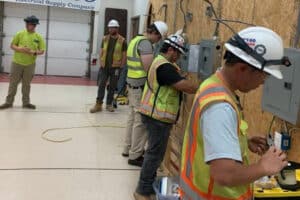
I work remotely, full time. When I was in electrical distribution, as a lighting designer, I worked remote three to four days a week and went into the Washington office one or two days a week. A lot of my working day took place on job sites, in frame in’s, or at a builder’s office. Being in my office every day would not have made sense.
I was fortunate; my bosses understood that this was the most productive approach. They were fortunate because I was trustworthy and thrived working alone. This was twenty five years ago…so…Congratulations Atlantic Electric Supply. You were ahead of your time.
I used to tell our kids, when they were growing up, that occasionally life will throw you a “Titanic” moment. A disaster that common sense could have avoided or mitigated. Never again would lifeboats be removed from a ship just to make it prettier…
The pandemic is proving to be a real “whop ass” moment on so many levels. Remote working and learning are in the barrel. If you have been tracking your company’s experiences and/or reading about industry reactions to forced remote work then you are aware there has been a range of reactions.
Stats vary, but it almost looks like it shakes out that nearly a third of people who had the ability to work remote did not like it. This surprised me because I LOVE it; when I read the reasons they reported, it made sense.
· Some people really struggle working in an isolated environment. Zooming is not enough, it isn’t real contact. Loneliness was a complaint.
· Being distracted by being at home was a problem for some workers; too tempted to have the news running, which also heightened their anxiety. Distracted by family members also stuck at home.
· Some workers feel better regimented by having a place to go to, their productivity dropped off working remote.
Flip the script- there were a large group of people who were very comfortable with working from home.
· They had no problem adjusting their hours around the flexibility of being home. If they had to start a little earlier to step away for the bustle of getting kids set up for their day, they worked that out.
· Secluding themselves to focus and be productive was not an issue.
· They were so happy about working remotely they became more productive- a life/work balance issue.
· The biggest problem for some was that they were inadvertently working too much- without realizing it they had started earlier or run later than they technically should have… “I’ll just answer this one last email…”
An obvious problem was that some companies could adjust easily to remote work and some struggled; if you already had remote employees in place it was not as big a leap to add more as it was remoting, perhaps, for the first time.
Not all work is suitable for a remote format. You certainly cannot bar tend, serve food, perform building maintenance work, drive a cab or bus, as a “remote” employee. Remote work is complicated. It only answers problems for certain industries and never will for others.
I experienced sales people from our Associate Partners (IECC members) reaching out to me with concerns and frustrations. How were they supposed to interface with builders, architects, and contractors if they couldn’t call on them?
IECC was able to assist member sales people by setting up free webinars about their new product offerings and/or the technical aspects of product they could not explain in person, due to the lockdown.
Manufacturers that had not previously taken advantage of our daily digital outreach (product starts on LinkedIn and is then propagated to four other platforms) caught on.
It doesn’t cost a thing for an IECC chapter member to promote product, announcements, change to legislations or licensing, through our digital marketing. It’s a part of what we do every day for members. We can expand your fan base…
Remote doesn’t need to be complicated. Many companies have discovered that it works better than they ever dreamed it would. Some businesses are also discovering they don’t need as much physical space as they have been occupying; if half or more of your force can productively work from a home office then perhaps you can go from 10,000SF to 3,000SF?
Remote work is here to stay for many companies across many industries. It will be the lifeboat lesson from the pandemic.
While we were “forced” to remote, the air got cleaner and waterways around the world cleared up. Less emissions, less pollution. That was nice.
IECC is not just hypothesizing. We have several staffers (me included) that work remotely and travel as needed- and have done for years.
We offer both brick and mortar “blended learning” and E Apprenticeship. We have offered apprenticeship online since 2013, recognizing students that performed night work shifts as well as students with care giving responsibilities.
We believe flexibility works. People are not cookie cutter; our solutions can’t be cookie cutter.
Jenny Boone
Business Development, IEC Chesapeake/IECC
#embraceremote













